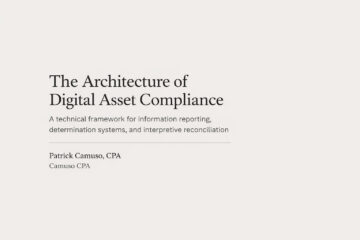Last Updated on April 5, 2025 by Patrick Camuso, CPA
Cryptocurrency tax regulations are evolving rapidly, presenting new challenges and opportunities for investors, businesses, and taxpayers involved with digital assets. As the Internal Revenue Service (IRS) increases its oversight of cryptocurrency transactions, understanding these changes is crucial to accurately report crypto profits, avoid penalties, and optimize tax strategies, including term capital gains.
In the United States, cryptocurrency is treated as property for tax purposes, which means that its tax treatment aligns with rules applicable to property transactions. Profits from selling cryptocurrency held for more than a year are subject to long-term capital gains tax rates of 0%, 15%, or 20%. This comprehensive guide unpacks recent regulatory updates, explains their tax implications, and offers practical advice for navigating the complex landscape of cryptocurrency taxes.
Key Takeaways
- Starting in 2025, cryptocurrency exchanges will issue IRS Form 1099-DA to taxpayers engaging in digital asset transactions, aiming to improve reporting accuracy. Taxpayers must carefully match exchange data with their own records to avoid duplicate reporting or mismatched filings.
- The IRS has introduced Revenue Procedure 2024-28, shifting crypto accounting from an asset-based approach to an account-based accounting method. This requires taxpayers to maintain separate records for each wallet or exchange account and reconcile these by the end of the tax year.
- There is an ongoing debate over the IRS’s proposed broader definition of a broker, potentially extending to decentralized exchanges (DEXs). If implemented, this could lead to Know Your Customer (KYC) requirements for DEX users and restrict U.S. access to some platforms.
- Investors must establish standing orders with brokers to select their accounting methods before conducting cryptocurrency transactions. This helps prevent retroactive adjustments to the cost basis and reduces the risk of IRS challenges.
- The IRS estimates a 75% non-compliance rate among cryptocurrency taxpayers and has intensified enforcement efforts through partnerships with crypto accounting software providers and increased audit readiness.
- Some states, including Washington and Pennsylvania, are exploring on-chain sales tax for NFTs and digital services, indicating a trend toward taxing digital asset sales at the state level.
New Regulations and Tax Challenges

The cryptocurrency industry is at a pivotal moment as new tax regulations come into effect. The IRS is deploying measures designed to bring digital asset transactions under stricter scrutiny. According to Patrick Camuso, CPA and Managing Director of Camuso CPA, “These regulatory shifts mark a turning point—businesses and investors must adapt to protect themselves from penalties.” The evolving tax landscape means cryptocurrency investors and businesses must stay informed about their tax obligations, including how cryptocurrency is taxed, what constitutes taxable events, and how to accurately report crypto transactions on their tax returns. In the United States, cryptocurrency is subject to capital gains tax when it is disposed of, and income tax when it is earned. If you exchange cryptocurrency for goods or services, this triggers a taxable event for capital gains tax based on the appreciation of the cryptocurrency.
Key Regulatory Changes: The New 1099-DA Form
One of the most notable changes is the introduction of Form 1099-DA, which exchanges will begin issuing in 2025 to individuals who engage in cryptocurrency transactions. This form is designed to capture detailed information about digital asset sales, exchanges, and other dispositions, helping the IRS track taxable capital assets and income from virtual currency more effectively.
From a tax perspective, taxpayers should verify the information reported on Form 1099-DA against their own transaction records to avoid discrepancies. Accurate reconciliation ensures that crypto capital gains and losses are reported correctly, preventing duplicate reporting of capital loss or mismatched filings that could trigger audits or penalties. When cryptocurrency is sold for a profit, the taxable profit is the difference between the adjusted basis in the cryptocurrency and the amount received in exchange. Taxpayers must report capital gains and losses from cryptocurrency transactions on IRS Form 8949.
The Broker Definition Debate
The IRS is considering broadening the definition of a broker to include decentralized exchanges (DEXs) and other intermediaries in cryptocurrency transactions. This change could have significant tax implications for cryptocurrency investors and users of decentralized platforms, including state taxes .
If DEXs are classified as brokers, they may be required to implement KYC procedures and report user transactions to the IRS. This could lead to restrictions on U.S. access to certain decentralized platforms, impacting how taxpayers buy, sell, or exchange digital assets. From a tax filing standpoint, this debate underscores the importance of understanding who is responsible for reporting cryptocurrency transactions and how tax compliance will be enforced in decentralized environments.
Revenue Procedure 2024-28
Revenue Procedure 2024-28 introduces a major shift in how cryptocurrency taxpayers must account for their digital assets. Previously, many taxpayers used an asset-based accounting method, tracking each individual cryptocurrency as a separate capital asset. The new rule requires account-based accounting, where taxpayers with a financial interest must maintain separate records for each wallet or exchange account to understand their effective tax rates. To determine capital gains or losses for cryptocurrency, you must consider the cost basis, which is generally the amount paid to acquire it. To calculate the capital gain or loss of a digital asset, you need to identify the units sold and determine fair market value.
This change means that taxpayers need to reconcile all cryptocurrency transactions within each account by the end of the tax year to determine accurate cost basis and calculate capital gains or losses. Patrick Camuso explains, “Account-based accounting aligns taxpayer records with IRS data, reducing audit disputes.” By adopting this method, taxpayers can more accurately report cryptocurrency capital gains and ensure they are compliant with all necessary taxes, minimizing errors that could lead to IRS scrutiny.
Setting Up Standing Orders
To comply with the new accounting methods, investors must establish standing orders with brokers regarding their chosen accounting methods before conducting transactions. This procedural requirement helps prevent retroactive adjustments to the cost basis, which can complicate tax reporting and increase the risk of IRS challenges by ensuring the value is correctly recorded .
Standing orders ensure that both the broker and the taxpayer agree on how cryptocurrency transactions are accounted for, providing clarity and consistency. For taxpayers, this step is essential to maintain accurate records of purchase price, fair market value, and other details necessary for calculating taxable income and capital gains taxes.
The IRS’s Enhanced Compliance Focus
The IRS has identified a significant non-compliance issue in cryptocurrency tax reporting, estimating that approximately 75% of taxpayers fail to report crypto profits accurately. In response, the agency is enhancing its enforcement efforts to determine how much tax is owed through partnerships with crypto accounting software providers and deploying sophisticated data analytics tools. The IRS can enforce penalties for failing to report cryptocurrency taxes, including fines and criminal prosecution.
Taxpayers should be prepared for increased audit activity and ensure their tax returns accurately reflect all cryptocurrency transactions, including sales, exchanges, mining rewards, and transfers. Proper documentation of cost basis, gross proceeds, and fair market value at the time of each taxable event is critical. Engaging a tax professional experienced in cryptocurrency taxes can help navigate these complexities and ensure that taxpayers know how to owe taxes accurately while reducing the risk of penalties for tax evasion or underreporting. If you receive cryptocurrency as compensation for labor, it is taxed as ordinary income based on the fair market value at the time of receipt.
Emerging Issue: On-Chain Sales Tax
Beyond federal income tax, some states are exploring the application of on-chain sales tax to digital asset transactions. States like Washington and Pennsylvania have indicated that sales of NFTs and convertible virtual currencies, specifically referring to virtual currency exchanges, and other digital services conducted on blockchain platforms may be subject to state sales tax. A digital asset that has an equivalent value in real currency is referred to as convertible virtual currency.
This development means that cryptocurrency investors and businesses accepting cryptocurrency as payment must consider state tax obligations in addition to federal income tax. Real-time tax calculation systems may become necessary to comply with these requirements. Understanding how and when to collect and remit sales tax on digital assets, especially during each taxable event, is becoming an essential part of cryptocurrency tax compliance.

Why This Matters
Complying with the evolving cryptocurrency tax regulations offers several benefits. First, it minimizes the risk of IRS audits and penalties, helping taxpayers avoid costly disputes. Second, accurate reporting enables better tax planning opportunities, allowing investors to optimize their tax rates, including short term capital gains tax, term capital gains tax, capital gains tax, ordinary income tax, and implications of a hard fork. Third, staying compliant ensures continued access to key platforms and exchanges that may require proof of tax compliance. When you dispose of crypto held for longer than a year, you pay a lower tax rate on your capital gains.
By understanding how cryptocurrency is taxed and the tax implications of various transactions, taxpayers can confidently manage their digital assets and fulfill their tax obligations.
Frequently Asked Questions
What is cryptocurrency tax?
Cryptocurrency tax refers to the taxes imposed on transactions involving digital assets such as Bitcoin, Ethereum, and other virtual currencies. In the United States, the IRS treats cryptocurrency as property for tax purposes, meaning that transactions involving crypto can trigger capital gains or income tax based on the nature of the transaction.
When is cryptocurrency taxed?
Cryptocurrency is taxed when you dispose of it, which includes selling it for fiat currency, exchanging it for other cryptocurrencies, or using it to purchase goods or services. Additionally, earning cryptocurrency through mining, staking, or as compensation is taxed as ordinary income at its fair market value at the time of receipt.
How are capital gains calculated for cryptocurrency?
Capital gains are calculated by subtracting the cost basis (generally the purchase price plus any fees) from the gross proceeds received upon disposal. If you held the cryptocurrency for more than one year before disposing of it, long-term capital gains tax rates apply; otherwise, short-term rates, which align with ordinary income tax rates, apply.
Do I have to report cryptocurrency transactions on my tax return?
Yes. Taxpayers must report all taxable cryptocurrency transactions on their tax returns, typically using IRS Form 8949 for capital gains and losses. Additionally, income from cryptocurrency received as payment or rewards must be reported as ordinary income.
What records should I keep for cryptocurrency taxes?
You should maintain detailed records of every cryptocurrency transaction, including dates of acquisition and disposal, purchase price, sale price, fees paid, and the fair market value at the time of each transaction. These records are essential for accurately calculating gains, losses, and income.
Is transferring cryptocurrency between wallets taxable?
Transferring cryptocurrency between wallets you own is generally not a taxable event, provided no sale or exchange occurs. However, any fees paid during the transfer may be deductible or affect your cost basis.
What is the new IRS Form 1099-DA?
Starting in 2025, cryptocurrency exchanges will issue Form 1099-DA to report digital asset transactions to both taxpayers and the IRS. This form aims to improve reporting accuracy by detailing sales, exchanges, and other dispositions of digital assets.
How does the holding period affect cryptocurrency tax rates?
If you hold cryptocurrency for more than one year before disposing of it, you benefit from lower long-term capital gains tax rates (0%, 15%, or 20%). Holding for less than a year subjects gains to higher short-term capital gains tax rates, which are equivalent to ordinary income tax rates.
Can I deduct losses from cryptocurrency transactions?
Yes. Capital losses from cryptocurrency transactions can offset capital gains from other assets. If losses exceed gains, you can deduct up to $3,000 of excess losses against ordinary income annually, with any remaining losses carried forward to future years.
Are cryptocurrency staking and mining rewards taxable?
Yes. Rewards earned from staking or mining cryptocurrency are considered ordinary income based on their fair market value at the time received. When you later dispose of these assets, you may also incur capital gains or losses.
What should I do if I receive cryptocurrency as payment for services?
Cryptocurrency received as payment for goods or services is taxable as ordinary income at its fair market value when received. You must report this income on your tax return and later calculate capital gains or losses when you dispose of the cryptocurrency.
How can I reduce my cryptocurrency tax liability?
Strategies include holding cryptocurrency for more than one year to qualify for long-term capital gains rates, tax-loss harvesting to offset gains with losses, donating cryptocurrency to charity to avoid capital gains tax, and consulting a tax professional to optimize your tax filing status and methods.
What happens if I don’t report my cryptocurrency taxes?
Failure to report cryptocurrency transactions can result in penalties, interest, and even criminal prosecution for tax evasion. The IRS has increased enforcement efforts and uses data analytics and information from exchanges to identify non-compliance.
Where can I get help with cryptocurrency tax reporting?
Professional tax advisors specializing in cryptocurrency, as well as cryptocurrency tax software, can assist in accurately tracking transactions, calculating gains and losses, and preparing tax forms to ensure compliance with IRS regulations.
9. Planning Ahead: Action Steps
To prepare for the changing crypto tax landscape, investors and businesses should take proactive measures with their exchange practices:
- Reconcile all cryptocurrency accounts before the end of the tax year to ensure accurate cost basis and capital gain or loss calculations.
- Set standing orders with brokers to establish accounting methods in compliance with Revenue Procedure 2024-28.
- Monitor state-level guidance on sales tax for digital assets to remain compliant with on-chain sales tax requirements.
- Consult with a crypto-specialized CPA or tax professional to navigate complex tax rules, optimize tax filing status, and accurately report cryptocurrency transactions on tax returns. Using cryptocurrency tax software simplifies tracking and reporting for users with multiple transactions.
- Reconcile all cryptocurrency accounts before the end of the tax year to ensure accurate cost basis and capital gain or loss calculations.
- Set standing orders with brokers to establish accounting methods in compliance with Revenue Procedure 2024-28.
- Monitor state-level guidance on sales tax for digital assets to remain compliant with on-chain sales tax requirements.
- Consult with a crypto-specialized CPA or tax professional to navigate complex tax rules, optimize tax filing status, and accurately report cryptocurrency transactions on tax returns.
Taking these steps will help taxpayers accurately report crypto taxes, pay taxes owed, and avoid pitfalls associated with non-compliance.
About Camuso CPA
Camuso CPA is a leading firm specializing in cryptocurrency tax, accounting, and compliance. With deep expertise in IRS regulations and the unique challenges of digital assets, we guide clients through evolving crypto tax rules, including implications of a hard fork, to ensure accurate reporting and strategic tax planning.
To prepare for the future of cryptocurrency tax compliance, book a strategy call with us or download our comprehensive Crypto Tax Guide for detailed instructions on how to report crypto transactions and minimize tax liabilities.






